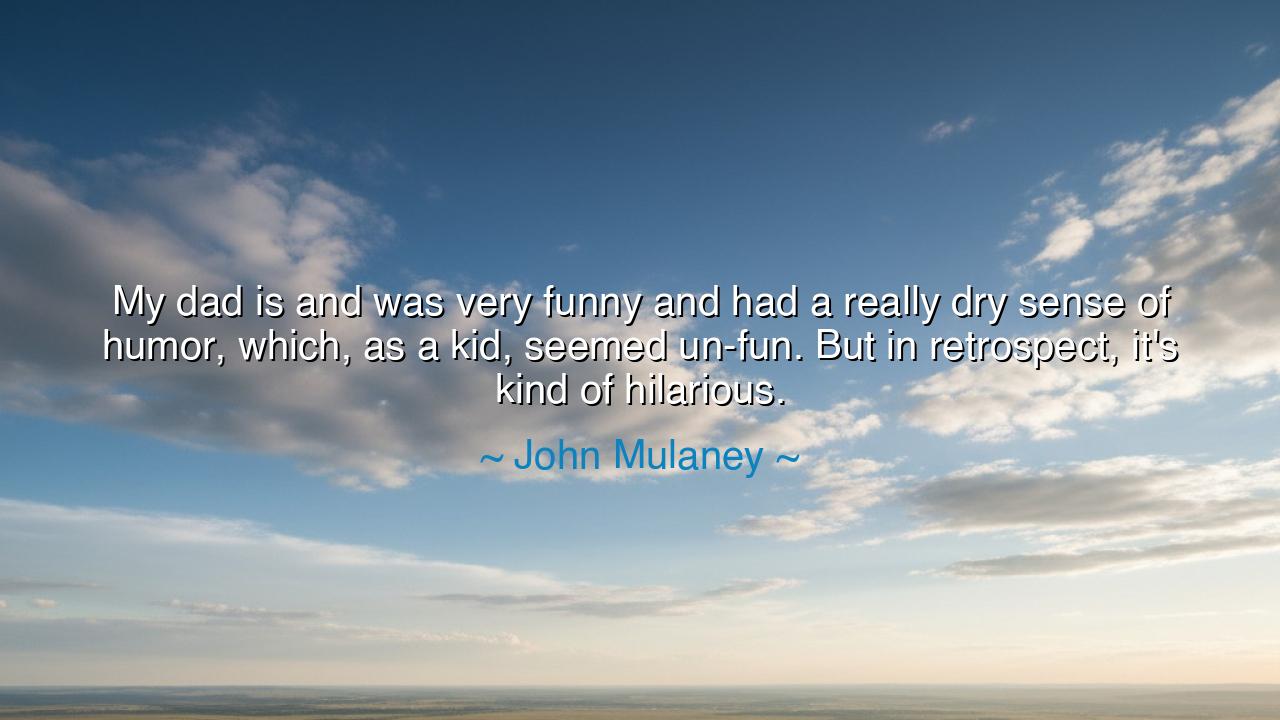
My dad is and was very funny and had a really dry sense of humor
My dad is and was very funny and had a really dry sense of humor, which, as a kid, seemed un-fun. But in retrospect, it's kind of hilarious.






“My dad is and was very funny and had a really dry sense of humor, which, as a kid, seemed un-fun. But in retrospect, it’s kind of hilarious.” — thus spoke John Mulaney, a craftsman of laughter and timing, a storyteller whose comedy often springs from memory and family. In these words, he reveals not merely a recollection of his father’s wit, but a profound meditation on time, perspective, and the quiet evolution of understanding. What once seemed strange or distant in youth becomes, with the passing of years, a source of tenderness and laughter. It is a reminder that humor — like wisdom — is often understood only after we have lived enough to look back.
When Mulaney speaks of his father’s dry sense of humor, he touches upon a truth known to many: that the humor of the wise is not always the humor of the young. As children, we crave laughter that is bright and obvious — the kind that dances on the surface, that requires no thought. But the dry humor of adults is the laughter of subtlety, born of irony, restraint, and patience. It is a humor that hides its warmth beneath a mask of seriousness, one that often leaves the child puzzled but the elder smiling. Only later, when we have walked a few more roads, do we recognize the hilarious truth behind those quiet remarks and steady expressions.
The ancients would have called this the humor of the philosopher — the laughter that arises not from folly, but from insight. For to see the world clearly, to recognize its contradictions and absurdities, is to find in it a kind of divine comedy. In ancient Athens, Socrates himself was known for his wit: calm, teasing, ironic. To his students, he often seemed cryptic or maddening, his jokes more bewildering than amusing. Yet in retrospect, his humor was the laughter of understanding — the ability to see human vanity and limitation with both sharpness and mercy. Mulaney’s father, in his quiet dryness, belongs to that lineage of wits who teach through understatement, whose laughter carries more wisdom than sound.
There is also something deeply human — even sacred — in the shift that comes “in retrospect.” For every child grows within the small circle of their own perception, unable to grasp the full meaning of what the elders say or do. What seems un-fun in youth often becomes precious in memory. The ancients taught that perspective is a gift given only to those who have endured both joy and sorrow, both the seriousness and the silliness of life. Mulaney’s reflection is not just about humor; it is about growth, about the awakening of gratitude for what once went unseen.
Think of the Roman general Marcus Aurelius, whose stoic calm was often mistaken for coldness by those around him. Yet his writings — quiet, reflective, and filled with wry humility — reveal a man who saw the tragic and the comic intertwined. His humor was not loud, but dry: the humor of endurance, of a man who could face hardship and still find a smirk in the universe’s indifference. Like Mulaney’s father, such souls remind us that laughter need not always be loud to be true. It may be soft, delayed, arriving years later when wisdom ripens and memory sweetens the sting of childhood misunderstanding.
In Mulaney’s words, we find the eternal dance between parent and child, youth and age, innocence and awareness. The father’s humor, misunderstood by the child, becomes a lesson the man later cherishes. It teaches us that much of life’s beauty is revealed not in the moment but in reflection — that laughter itself can mature, deepening like wine with time. What we first resisted may later sustain us; what we once dismissed may, in retrospect, become a treasure of the soul.
So let this teaching be carried forward: Do not rush to judge what you cannot yet understand. The humor that seems cold may be a sign of quiet wisdom. The person who appears distant may love you more deeply than you yet realize. Look back often, and look back kindly, for time will turn many of your confusions into laughter. And when you find yourself in that moment of understanding — when something once “un-fun” becomes “hilarious” — smile with gratitude. For you will have joined the ancient circle of those who see life clearly enough to laugh at its mysteries, and lovingly enough to forgive them.






AAdministratorAdministrator
Welcome, honored guests. Please leave a comment, we will respond soon